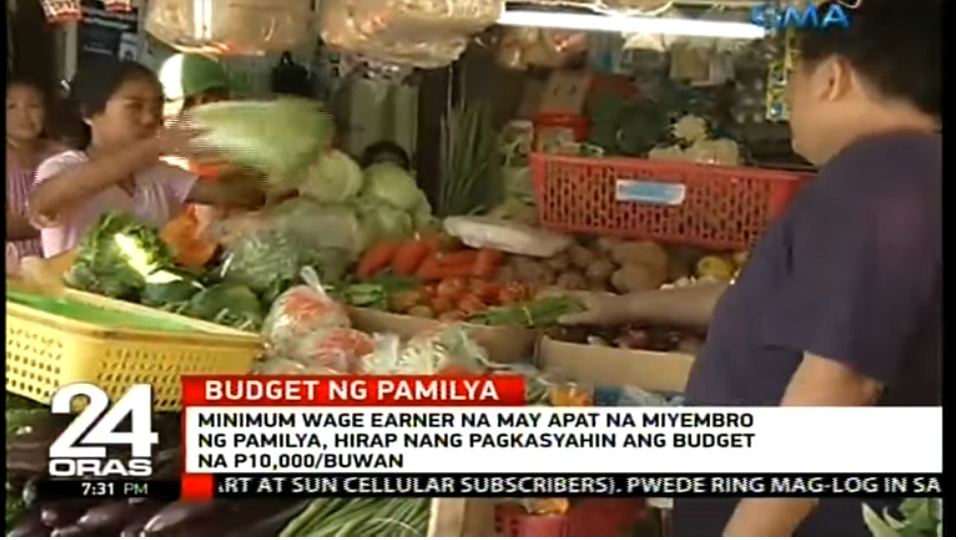Getting Real on NEDA’s Family Budget

Screengrab from GMA News YouTube account.
THE NATIONAL Economic and Development Authority (NEDA), Department of Finance (DOF) and the Department of Budget and Management (DBM) held a press briefing on June 5, 2018 to discuss issues involved in the skyrocketing inflation rate. At 4.6%, the rate of increase in consumer rate hit a new five-year high last May.
Explaining factors that cause price increases and breaking down inflation figures, NEDA presented the “Monthly consumer basket of an average Filipino family,” the PHP10,000 budget of an average Filipino family which Undersecretary Rosemarie Edillon claimed was based on the Family Income and Expenditures Survey (FIES) (“Press Briefing on the May 2018 Inflation Report DBM Main Building II, Malacañang Complex June 5, 2018“).
Most media coverage of the briefing recorded NEDA’s inflation figures with little effort to clarify what these meant and how it would impact on the public.
On the same day, Maki Pulido’s report for 24 Oras featured a rundown of food items that can be bought with PHP127, which was the daily budget allotted by NEDA for food in the “consumer basket.” Pulido said, “Sa kwenta ng NEDA, disenteng budget na ang sampung libong kada buwan ng isang minimum wage earner para sa isang pamilyang may limang myembro.” (According to NEDA’s account, PHP10,000 is decent monthly budget for a minimum wage earner with a family of five) (“REPLAY: 24 Oras Livestream [June 5, 2018]”).
The 24 Oras report also said that the NEDA claimed an income of PHP10,000 does not make you poor. Pulido told CMFR that in an ambush interview with Edillon she explicitly asked Edillon, “Mabubuhay ka nang disente sa PHP10,000?” (Will you live decently with PHP10,000?) – a question not included in the footage. The report however showed the undersecretary replying: “Siguro nasa 5th (income) decile ka nun. Hindi ka poor, kasi ang poor natin… Mababa ang poverty line (threshold).” (You would probably be in the 5th decile. You are not poor, because our poor… Our poverty line is low.)
This report stirred controversy and provoked NEDA to respond. A number of politicians and labor leaders protested. Sen. Ralph Recto challenged NEDA officials to reduce their salary to PHP10,000 for three months. Sen. Panfilo Lacson made a sarcastic remark that “we can survive with PHP10 a month as long as we stopped breathing,” (“Neda’s ‘P10K a month’ statement draws flak from Lacson, fellow senators”).
NEDA immediately issued a clarification saying that PHP10,000 was a mere sample budget used to “illustrate the impact of the May 2018 inflation rate on a family’s budget.” In a statement released on June 8, Socio-economic Planning Secretary Ernesto Pernia said that it used PHP10,000 for practical reasons as it is “easy to multiply with any number depending on the actual budget of each family” (“Pernia: TV report, not Neda, said P10,000 budget enough“).
In the live coverage of the press briefing that aired on RTVM, Pulido asked a series of questions about the PHP10,000 budget, trying to understand the point of the exercise. How did NEDA come up with the budget? She also questioned the estimate for expenses, stressing other needs such as school and allowance costs, which were not emphasized in the basket. Edillon said that the budget was “centered on an average.”
CMFR checked the most recent Family Income and Expenditure Survey (FIES), conducted by the Philippine Statistics Authority (PSA) in 2015 and found that the average family income is estimated at PHP22,000 monthly, more than twice the value that NEDA used in their presentation. (“Average Family Income in 2015 is Estimated at 22 Thousand Pesos Monthly [Results from the 2015 Family Income and Expenditure Survey]”).
While NEDA did not use the word “disente” or decent to describe its budget, Pulido’s understanding was pretty much on point. The exercise reflected NEDA’s take on how Filipino families living on PHP10,000 survive. And the public was right to question whether such a point is acceptable, given that so many live on much less. Whether or not the case was hypothetical, whether one could interpret the budget as decent, below or above standards of poverty, the exercise was designed to belie how badly Filipinos are struggling to cope with high prices.
Clearly, NEDA conducted the press briefing as part of the administration’s clap-back against critics of the TRAIN law. Using a low monthly budget was supposed to have the desired effect of pacifying the qualms caused by price hikes and the plummeting peso value.
The response of media should be: Get real! Which is exactly what Pulido did.
Leave a Reply